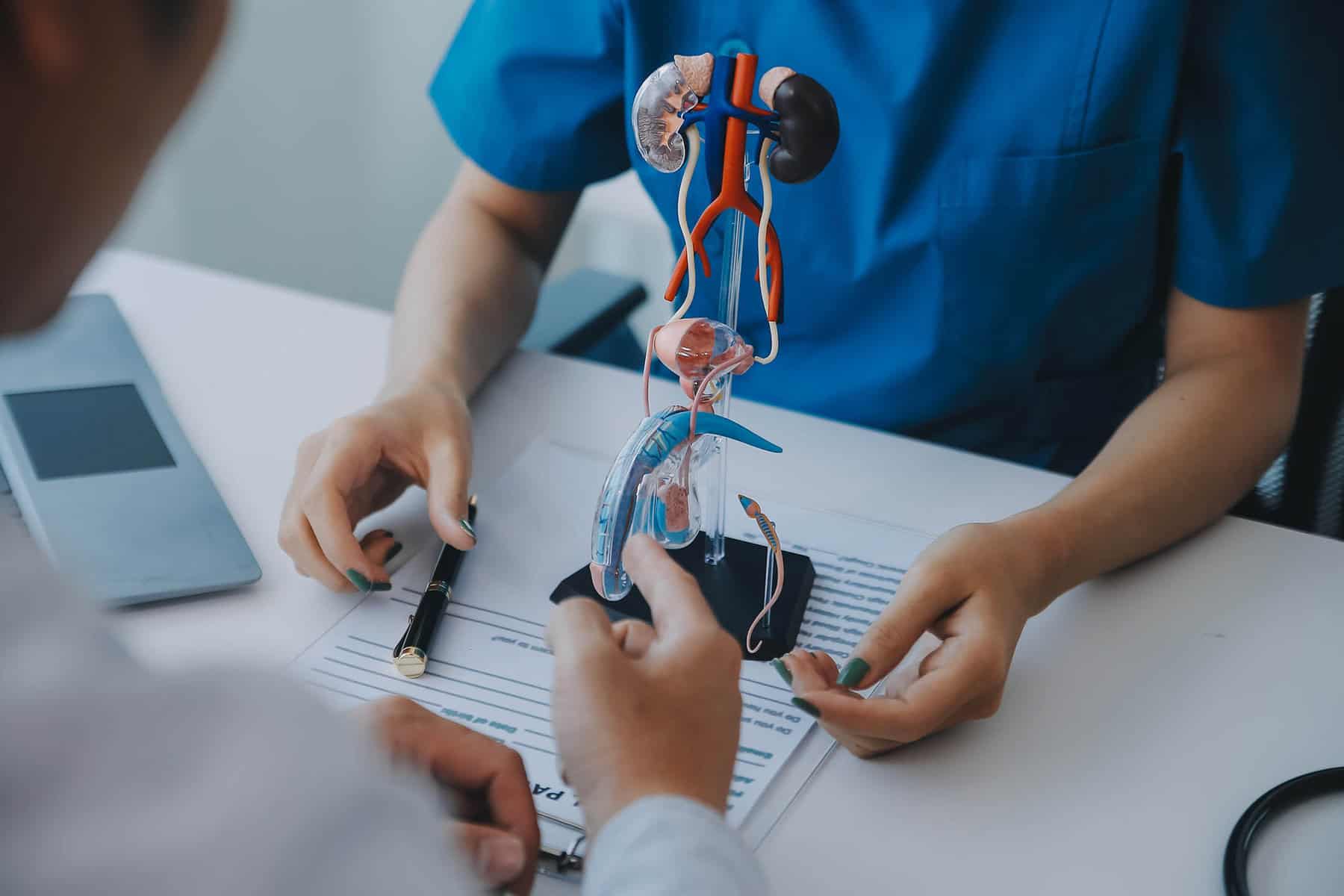Expert Care for Male Urinary Incontinence
Struggling with urinary incontinence? Discover effective treatments at The Forbury Clinic. Submit an enquiry for a consultation and regain control with our expert care.

Overview of Male Urinary Incontinence
Male urinary incontinence, the involuntary leakage of urine, is a common yet often distressing condition. It can significantly impact daily life and overall well-being, affecting self-confidence and social interactions. Incontinence may result from various underlying health issues, including prostate problems, neurological disorders, or age-related changes. Addressing urinary incontinence promptly is crucial for improving quality of life and preventing further complications. At The Forbury Clinic, we specialise in diagnosing and treating male urinary incontinence with a patient-centred approach. Our experienced team uses advanced diagnostic tools and tailored treatment plans to provide effective solutions, helping you regain control and confidence.


What is Male Urinary Incontinence?
Male urinary incontinence is the unintentional leakage of urine, a condition that can vary in severity from occasional dribbling to complete loss of bladder control. This condition can significantly impact daily activities, emotional well-being, and quality of life. There are several types of urinary incontinence:
- Stress Incontinence: Leakage of urine during activities that increase abdominal pressure, such as coughing, sneezing, laughing, or lifting heavy objects.
- Urge Incontinence: A sudden, intense urge to urinate followed by an involuntary loss of urine. It is often associated with an overactive bladder.
- Overflow Incontinence: Frequent or constant dribbling of urine due to a bladder that doesn’t empty completely.
- Functional Incontinence: Occurs when a person cannot reach the toilet in time due to physical or mental impairments.
Causes and Risk Factors
Male urinary incontinence can be caused by various factors, often related to underlying health conditions or lifestyle choices. Key causes and risk factors include:
Prostate Problems:
Conditions such as benign prostatic hyperplasia (BPH) or prostate cancer and its treatments (surgery or radiation) can affect bladder control.
Neurological Disorders:
Diseases like Parkinson’s, multiple sclerosis, or stroke can disrupt nerve signals involved in bladder control.
Age:
As men age, the muscles in the bladder and urethra can weaken, leading to incontinence.
Obesity:
Excess weight can put additional pressure on the bladder, leading to stress incontinence.
Chronic Cough:
Conditions causing chronic cough, such as smoking or lung disease, can increase abdominal pressure and cause stress incontinence.
Diabetes:
High blood sugar levels can damage the nerves controlling the bladder.
Infections:
Urinary tract infections can irritate the bladder, causing strong urges to urinate.
Medications:
Certain medications, such as diuretics, can increase urine production and exacerbate incontinence.
Diagnosis
Diagnosing male urinary incontinence at The Forbury Clinic involves a comprehensive evaluation to determine the underlying cause and type of incontinence. Our specialists use a combination of advanced diagnostic tools and personalised assessments, including:
- Medical History and Physical Examination: A detailed discussion of your symptoms, medical history, and any medications you are taking, followed by a physical examination to check for signs of underlying conditions.
- Urine Tests: Urinalysis to detect infections, blood, or other abnormalities in the urine.
- Bladder Diary: Keeping a record of fluid intake, urination times, and episodes of incontinence can help identify patterns and triggers.
- Postvoid Residual Measurement: Measuring the amount of urine left in the bladder after urination to check for incomplete emptying.
- Urodynamic Testing: Assessing how well the bladder and urethra store and release urine.
- Cystoscopy: A procedure using a thin tube with a camera to inspect the inside of the bladder and urethra for abnormalities.
These diagnostic methods allow our team to accurately identify the cause of urinary incontinence and develop a tailored treatment plan.

Treatment of Male Urinary Incontinence
At The Forbury Clinic, we offer a comprehensive range of treatment options for male urinary incontinence, tailored to the individual needs of each patient. Our approach combines the latest medical advancements with compassionate, patient-centred care:
Treating Reversible Causes:
Addressing any underlying conditions or lifestyle factors contributing to incontinence, such as infections or medications.
Pelvic Floor Exercises:
Strengthening the muscles that control urination through exercises like Kegels can help improve bladder control.
Bladder Training:
Techniques to increase the interval between urination and to improve bladder capacity and control.
Medications:
Anticholinergics:
Medications that relax the bladder muscle and help reduce symptoms of urge incontinence.
Alpha-blockers:
Used to relax the muscles of the prostate and bladder neck in cases of overflow incontinence due to an enlarged prostate.
Mirabegron:
A medication that relaxes the bladder muscle and increases bladder capacity.
Minimally Invasive Procedures:
Injections:
Bulking agents can be injected into the urethra to help close the bladder opening and reduce stress incontinence.
Nerve Stimulation:
Devices like sacral nerve stimulators can help control urge incontinence by regulating bladder function.
Surgical Interventions:
Artificial Urinary Sphincter:
A device implanted to control the flow of urine and prevent leakage.
Male Sling Procedure:
A surgical option to provide support to the urethra and reduce stress incontinence.
Innovative Treatments
The Forbury Clinic offers cutting-edge treatments, such as laser therapy, to provide effective relief with minimal recovery time.
Our multidisciplinary team ensures that each patient receives the most appropriate and effective treatment, enhancing their quality of life and managing their condition with precision and care.
Managing Male Urinary Incontinence
Effective management of male urinary incontinence involves a combination of medical treatments and lifestyle adjustments to control symptoms and improve quality of life. At The Forbury Clinic, we provide comprehensive care and guidance to help manage this condition:
Lifestyle Modifications:
Recommendations include maintaining a healthy weight, avoiding caffeine and alcohol, and quitting smoking to reduce bladder irritation.
Fluid Management:
Regulating fluid intake to prevent overloading the bladder and planning fluid consumption to avoid frequent urination at night.
Scheduled Toilet Trips:
Encouraging timed voiding to establish a regular urination schedule.
Pelvic Floor Exercises:
Strengthening pelvic floor muscles with exercises such as Kegels can help improve bladder control.
Bladder Training:
Techniques to gradually increase the intervals between urination and improve bladder capacity.
Incontinence Products:
Using absorbent pads, protective garments, or urinary sheaths to manage leakage discreetly.
These management strategies aim to complement medical treatments and provide a holistic approach to controlling symptoms and preventing future occurrences of urinary incontinence.
Complications
While male urinary incontinence can often be managed effectively, untreated or persistent incontinence can lead to several complications that may affect overall health:
- Skin Irritation and Infections: Continuous leakage can cause skin problems, including rashes, sores, and infections.
- Urinary Tract Infections (UTIs): Frequent or untreated incontinence can lead to recurrent urinary tract infections.
- Impact on Quality of Life: Incontinence can significantly affect daily activities, self-esteem, and social interactions, leading to anxiety and depression.
- Prostate Issues: Persistent incontinence can be a sign of underlying prostate problems that require medical attention.
Prognosis
The prognosis for male urinary incontinence largely depends on the underlying cause and the effectiveness of the treatment plan. With timely diagnosis and appropriate treatment, most men can achieve significant improvement in symptoms and regain control over their bladder function. Regular follow-ups and monitoring are crucial to adjusting treatment plans as needed and preventing complications. At The Forbury Clinic, we are dedicated to guiding our patients through their treatment journey with comprehensive care and support, ensuring the best possible outcomes and a higher quality of life.


Why Choose The Forbury Clinic?
Choosing The Forbury Clinic for your male urinary incontinence treatment offers numerous benefits. Our clinic is renowned for its expert medical staff, who possess extensive experience in diagnosing and managing urinary incontinence. We leverage cutting-edge technology to provide accurate diagnoses and innovative treatment options, ensuring the highest standard of care. Our patient-centred approach ensures that each treatment plan is tailored to meet the unique needs of our patients, fostering a supportive and compassionate environment. At The Forbury Clinic, you are assured of receiving the most effective and comprehensive care to help you regain control and improve your quality of life.